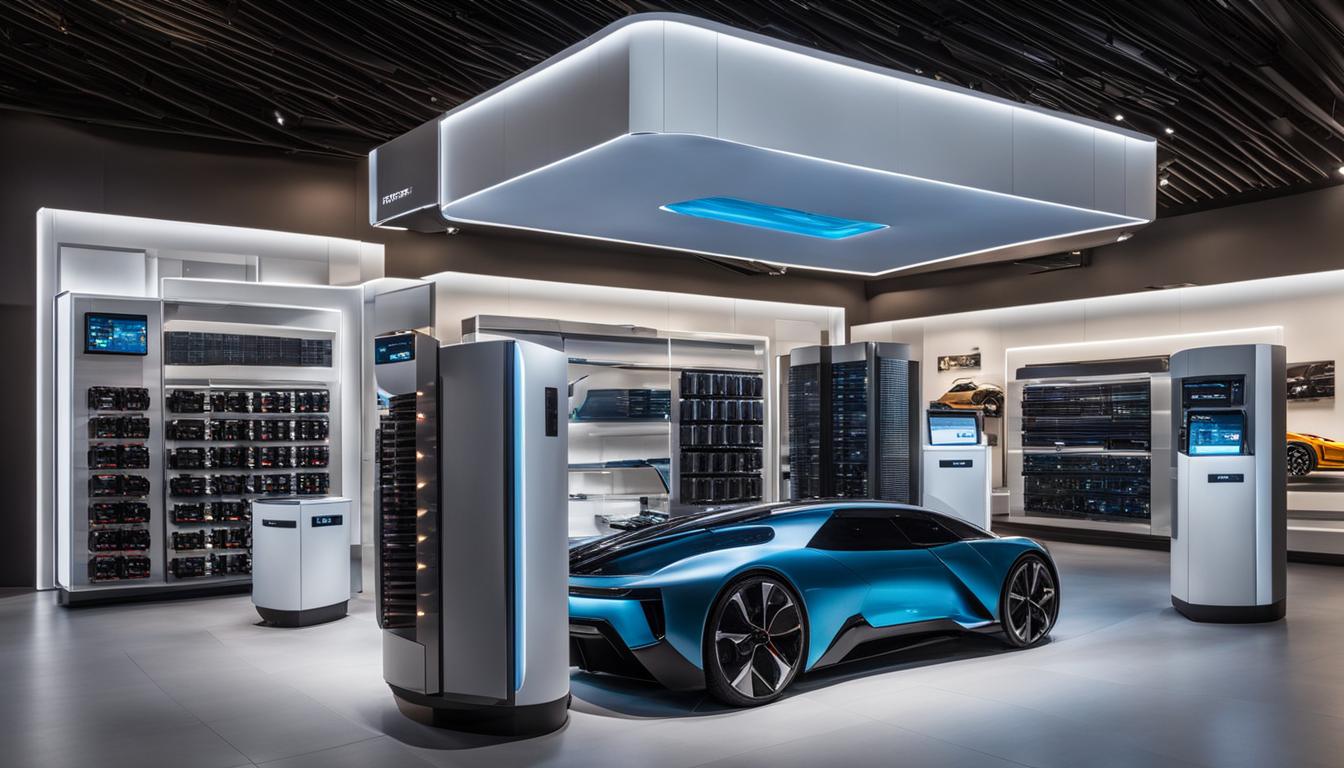
Storing Energy for Tomorrow: Vehicle Energy Storage Solutions Decoded
As the future of mobility evolves towards sustainable transportation, vehicle energy storage solutions play a crucial role. These solutions are essential for powering electric and hybrid vehicles, enabling the efficient storage and utilization of energy. The development of vehicle energy storage solutions is driven by the pressing need to reduce carbon emissions and dependence on fossil fuels, contributing to the creation of a greener and more sustainable transportation system.
Significant advancements have been made in battery technology, resulting in more efficient and longer-lasting energy storage solutions for vehicles. Lithium-ion batteries, currently the most commonly used type of battery in electric vehicles, offer high energy density and longer driving range. However, research and development efforts are continuously improving battery technology to enhance performance and durability.
In addition to lithium-ion batteries, other energy storage technologies, such as hydrogen fuel cells, are also being explored for vehicle applications. The implementation of vehicle energy storage solutions is pivotal for the widespread adoption of electric and hybrid vehicles. Governments and regulatory bodies are incentivizing the development and usage of these solutions through various policies and programs.
Key Takeaways:
- Vehicle energy storage solutions power electric and hybrid vehicles, contributing to sustainable transportation.
- Battery technology, particularly lithium-ion batteries, has witnessed significant advancements, enabling longer driving ranges.
- Other energy storage technologies, like hydrogen fuel cells, are being explored for vehicle applications.
- The widespread adoption of electric and hybrid vehicles relies on the implementation of these storage solutions.
- Governments and regulatory bodies are promoting the development and usage of vehicle energy storage solutions.
Advancements in Battery Technology for Vehicle Energy Storage Solutions
Battery technology plays a crucial role in the development of vehicle energy storage solutions. The advancements in battery technology have been instrumental in unlocking the potential of electric vehicles and sustainable transportation.
Lithium-ion batteries have emerged as the most commonly used type of battery in electric vehicles, offering a high energy density that allows for longer driving ranges. Ongoing research and development efforts are focused on improving the performance and durability of lithium-ion batteries, making them even more efficient and reliable.

In recent years, solid-state batteries have gained attention as a promising alternative to traditional lithium-ion batteries. Solid-state batteries offer increased energy density, faster charging times, and enhanced safety features. This technology breakthrough has the potential to revolutionize the electric vehicle industry and overcome some of the limitations of current battery solutions.
Furthermore, there are ongoing explorations of other battery technologies for vehicle applications, such as lithium-sulfur and lithium-air batteries. These alternative battery technologies hold the promise of even higher energy densities and longer-lasting performance, which are crucial for the widespread adoption of electric vehicles.
To address the environmental impact of battery production and disposal, battery recycling and repurposing programs are being implemented. These initiatives promote the sustainable management of end-of-life batteries and contribute to the overall sustainability of vehicle energy storage solutions.
However, the cost of batteries remains a significant barrier to the mass adoption of electric vehicles. Efforts are being made to reduce battery costs through economies of scale and technological advancements. The continuous improvement in battery technology and economies of scale are expected to drive down costs, making electric vehicles more affordable and accessible to a wider audience.
Advancements in Battery Technology Table
| Battery Technology | Main Advantages | Applications |
|---|---|---|
| Lithium-ion Batteries | – High energy density for longer driving ranges – Continuous improvement in performance and durability | Electric vehicles, hybrid vehicles |
| Solid-state Batteries | – Increased energy density – Faster charging times – Enhanced safety features | Electric vehicles, renewable energy storage |
| Other Battery Technologies (e.g., lithium-sulfur, lithium-air) | – Potential for higher energy densities – Longer-lasting performance | Electric vehicles, aviation, marine, renewable energy storage |
The Future of Vehicle Energy Storage Solutions: Challenges and Opportunities
While vehicle energy storage solutions offer numerous benefits, they also face several challenges that need to be addressed for their widespread adoption and optimization. One of the key challenges is the limited availability of raw materials, such as lithium and cobalt, which are crucial for the production of batteries. The scalability of battery production is heavily dependent on the availability and responsible sourcing of these materials.
Another significant challenge is the development of a robust infrastructure to support the widespread adoption of electric and hybrid vehicles. This includes expanding and optimizing the charging infrastructure to meet the growing demand for electric vehicle charging. Efforts are being made to establish a comprehensive network of charging stations and implement smart charging solutions to enhance convenience and accessibility.
To further enhance vehicle energy storage solutions, improving their efficiency and energy density is an ongoing research and development goal. Advances in battery technology, such as the development of solid-state batteries and alternative battery chemistries, present opportunities to overcome the limitations of current solutions. These advancements can lead to longer driving ranges, faster charging times, and improved overall performance.
Moreover, the integration of renewable energy sources and vehicle-to-grid technologies presents opportunities for optimizing the use of vehicle energy storage. By enabling bidirectional energy flow between vehicles and the grid, excess energy from electric vehicles can be stored and utilized during peak demand periods, contributing to the stability and reliability of the electricity grid.
Addressing these challenges and seizing the opportunities will require collaboration between automakers, battery manufacturers, energy companies, and government entities. By working together, stakeholders can drive the development and adoption of vehicle energy storage solutions, creating a greener and more sustainable transportation system. Government support and incentives are crucial in accelerating the progress and ensuring the transformation of the transportation sector for a more sustainable future.
FAQ
What are vehicle energy storage solutions?
Vehicle energy storage solutions are technologies that allow for the storage and efficient use of energy in vehicles, particularly electric and hybrid vehicles. These solutions are crucial for the future of sustainable transportation and play a vital role in powering these vehicles.
Why are vehicle energy storage solutions important?
Vehicle energy storage solutions are important because they contribute to reducing carbon emissions and dependence on fossil fuels in the transportation sector. They are a key component of creating a greener and more sustainable transportation system.
What advancements have been made in battery technology for vehicle energy storage solutions?
Major advancements have been made in battery technology, leading to more efficient and longer-lasting energy storage solutions for vehicles. Lithium-ion batteries are the most commonly used type of battery in electric vehicles, offering high energy density and longer driving ranges. Solid-state batteries and other technologies like lithium-sulfur and lithium-air batteries are emerging as promising alternatives with higher energy density, faster charging times, and enhanced safety features.
How can vehicle energy storage solutions be improved?
Ongoing research and development efforts are focused on improving the performance, durability, efficiency, and energy density of vehicle energy storage solutions. The development of high-capacity and fast-charging batteries is crucial for the widespread adoption of electric vehicles. Additionally, battery recycling and repurposing programs are being implemented to address the environmental impact of battery production and disposal.
What challenges do vehicle energy storage solutions face?
Vehicle energy storage solutions face challenges such as the limited availability of raw materials like lithium and cobalt, which poses a challenge to the scalability of battery production. The development of a robust infrastructure to support the widespread adoption of electric and hybrid vehicles is also a significant challenge, including the expansion and optimization of the charging infrastructure. Moreover, reducing the cost of batteries remains a barrier to the mass adoption of electric vehicles.
What opportunities are there for vehicle energy storage solutions?
The integration of renewable energy sources and vehicle-to-grid technologies presents opportunities for optimizing the use of vehicle energy storage. These solutions have the potential to enhance the reliability and resilience of the electricity grid. Collaboration between automakers, battery manufacturers, and energy companies is crucial for the advancement of vehicle energy storage solutions, and continued government support and incentives are necessary to accelerate their development and adoption.
